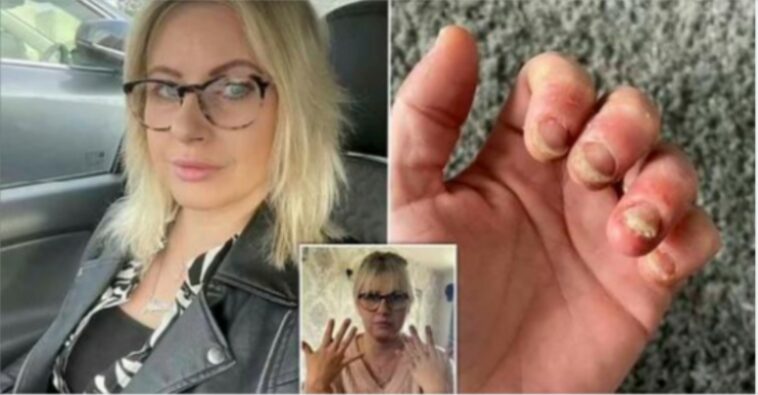A mother of two describes the terrifying experience of losing the use of her hands after what was thought to be an allergic reaction to manicure treatments.
For a long time, Lisa Dewey of Pattishall, Northamptonshire, had received routine gel manicures without any issues. But following a regular visit in February, the 36-year-old observed that her fingers were becoming irritated and that her nails were starting to come out.
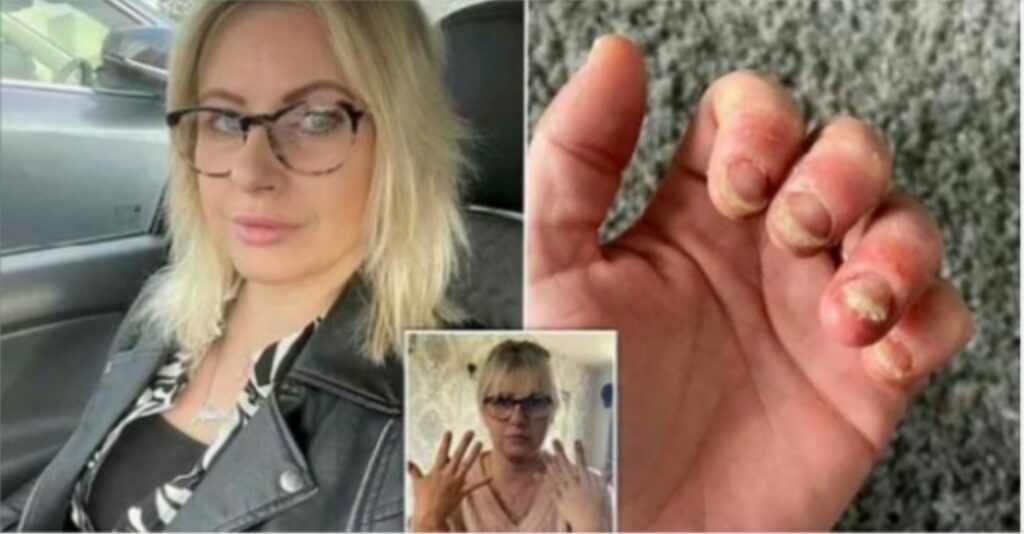
The situation got worse as one finger took on a spooky purple hue. it was causing her to worry that she would snap.
After seeing a doctor, Mrs. Dewey was identified as having a bacterial infection. Her physician recommended an antibiotic and steroid cream as treatment.
Her fingers have sadly gotten substantially worse because she recently had another manicure. She felt excruciating agony and her hand’s range of motion was significantly limited.
Lisa felt her problems were related to her gel manicures after taking into account her symptoms.
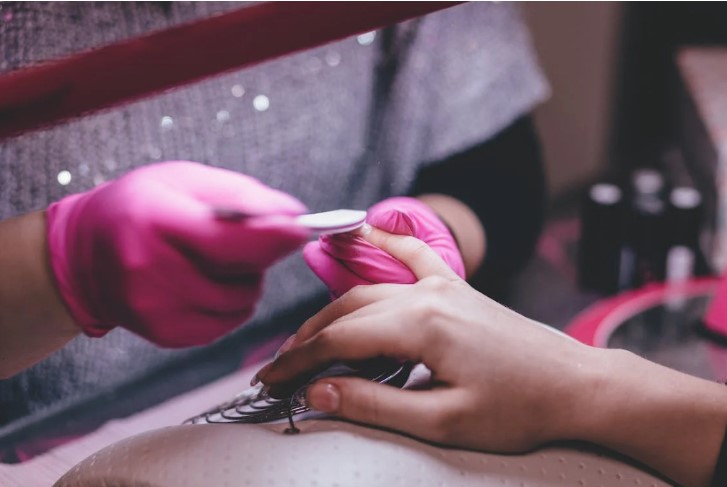
Mrs. Dewey, a cleaning specialist for the NHS, has discovered that she might be allergic to a component of gel nail paint. This is consistent with dermatologists’ recent calls for increased caution. In February, shortly after receiving her routine gel nail treatment, Mrs. Dewey, a dedicated mother of two kids, ages three and twelve, had an unexpected reaction.
She wasn’t expecting her nails to start pulling away from the nail bed within a few days. One even turned purple. The remainder of her nails, however, started to hurt and itch a lot. She had never before considered the possibility that her frequent manicure regimen might be to blame.
Reflecting on her lifelong habit of getting acrylics or gel nails, Mrs. Dewey shared. “I’ve been getting my nails done all my life. When it first occurred after getting a set of gels in February, I initially thought it was a bacterial infection.” Mrs. Dewey said.
Believing that the cause was an allergic reaction, Mrs. Dewey was convinced
Her finger’s purple discoloration around the nail made her nervous. causing her to worry that she would lose a finger to lack of air. The real cause, however, turned out to be something very different. Antibiotics were given to her by her doctors, who assumed she had an illness.
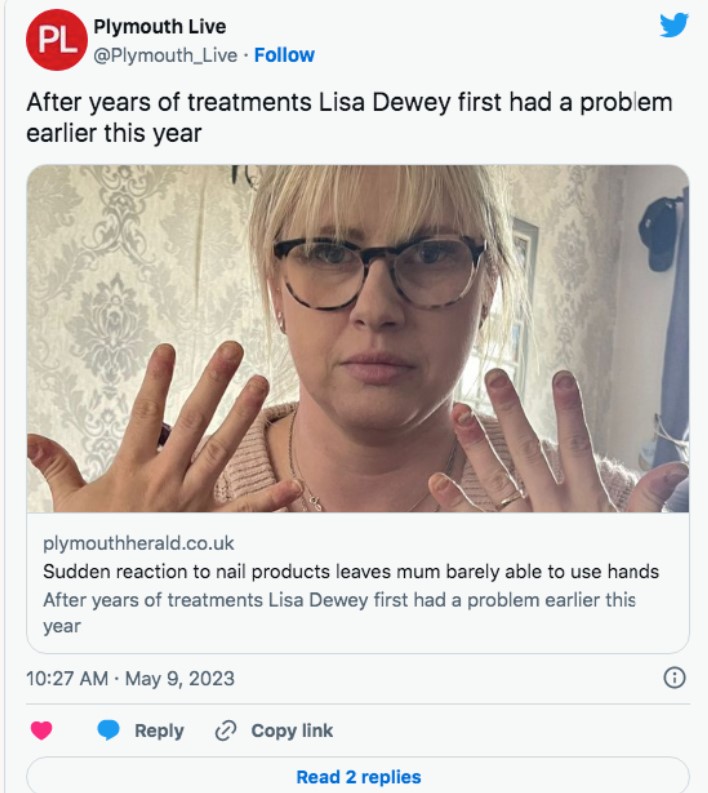
Mrs. Dewey thought the ordeal was over after removing the gels and taking a break from nail care products. Unfortunately, the reaction worsened when she had artificial nails applied once more in April. Her fingernails started to rise up once more, and the skin around them grew as thin as paper.
Furthermore, the intense discomfort rendered her hands motionless. She recently got a fresh prescription to treat her problem with a different drug. Mrs. Dewey personally thinks an allergic reaction is to blame for her symptoms, despite not revealing the exact medical opinion that caused them.
Not alone, it seems gel manicures are causing problems more commonly than ever before
The British Association of Dermatologists last month issued a warning that was in keeping with her experience. This underlines the fact that doctors are treating patients for allergic reactions connected to acrylic and gel nails more and more frequently.
The British Association of Dermatologists issued a warning, attributing the frequent reaction to the use of at-home gel polish kits and improperly qualified manicurists. They emphasized that the reaction happens when the UV light, which is required for the polish’s polymerization process, is not applied for a long enough time.
Methacrylates may leak as a result of this inadequate UV exposure. The skin absorbs the chemical elements of gel nail polish. As a result, people could get skin rashes, detachable nails, and in extreme circumstances, breathing problems. Additionally, people impacted may experience “life-long sensitization,” a long-lasting sensitivity or hypersensitivity to certain compounds.
Such a reaction may have important repercussions. The ability of affected people to have necessary future surgeries, such as knee replacements, cataract operations, or dental work, may be restricted. Due to the fact that these procedures expose patients to the same substances that cause their negative reactions.
Now in constant discomfort, Lisa finds even the simplest tasks hard to do
Mrs. Dewey’s daily life has become challenging due to the persistent pain in her hands and nails, necessitating constant assistance from her husband, Lee, aged 45. She shared, “Simple tasks like washing my daughter’s hair have become difficult because it requires finger movements. Even securing her in the car seat becomes excruciating if my finger grazes the belt, as the raw skin intensifies the pain.”
“The condition worsens even with the use of gloves, as sweaty hands exacerbate the symptoms. Additionally, anything scented or fragranced aggravates the situation, preventing me from applying conditioning treatments or hair mousse.”
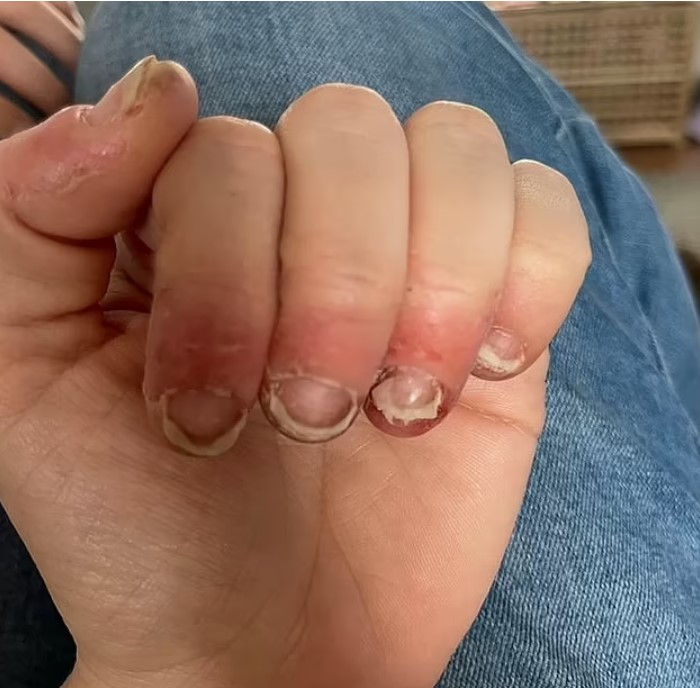
Determined to prioritize her well-being, Mrs. Dewey has made the decision to permanently avoid nail products. She is also committed to warning others about the associated risks. She expressed, “People can have years of nail treatments without any issues until one day it unexpectedly affects them. I had planned to get my hands and toes done for my upcoming August holiday, but now I have canceled those appointments. This experience has significantly impacted my confidence.”
“Normally, I am unconcerned about others’ opinions, but now I feel compelled to hide my hands. It’s truly embarrassing to have hands in this condition. There’s a celebration this week, but if my hands haven’t improved, I won’t be attending. I simply want to contribute by spreading awareness that things may not be as benign as they appear.”
“The chemicals in gel nail polishes, known as methacrylates, can trigger an allergic reaction if they leak into the skin. This can see nails loosen and the skin develops a severe, itchy rash. At-home gel manicures are the most likely culprit for triggering the painful reaction but even salon nail treatments can pose a risk if the technician is poorly-trained.”
“During gel manicures, methacrylates can enter the skin when the ultraviolet lamps — used to harden each layer of gel — are not used for long enough. It can also occur if the equipment is poorly maintained. If the gel is not sufficiently ‘cured’ for the correct period of time, a reaction to the chemicals may also occur on the skin around the nails.”
“Each gel polish brand has an exact curing time which should be adhered to, often either 30 seconds, 60 seconds or 90 seconds. But experts warned that nail technicians rushing clients out of salons when the gel is not sufficiently cured can also trigger an allergic reaction. Sufferers can have a ‘life-long sensitization’ to the chemicals.”
